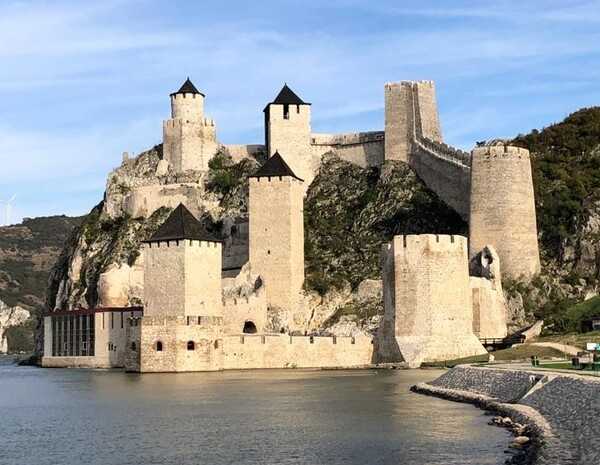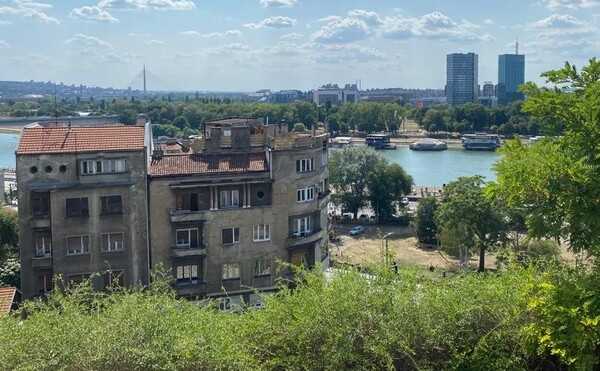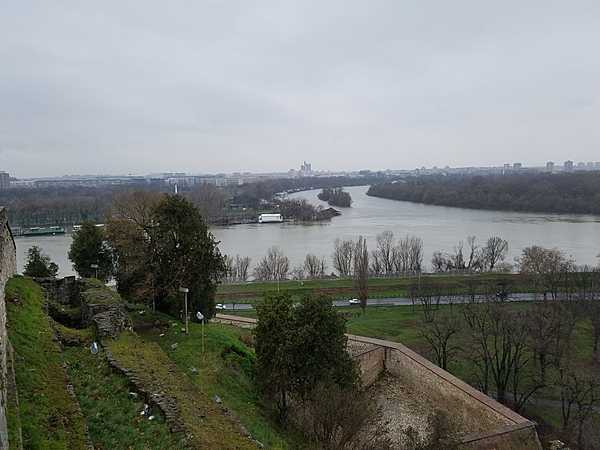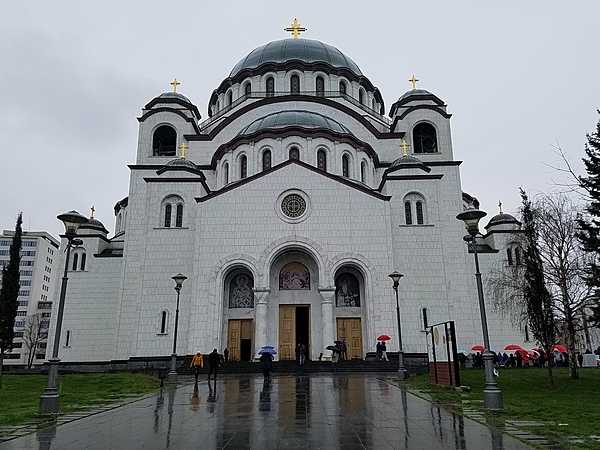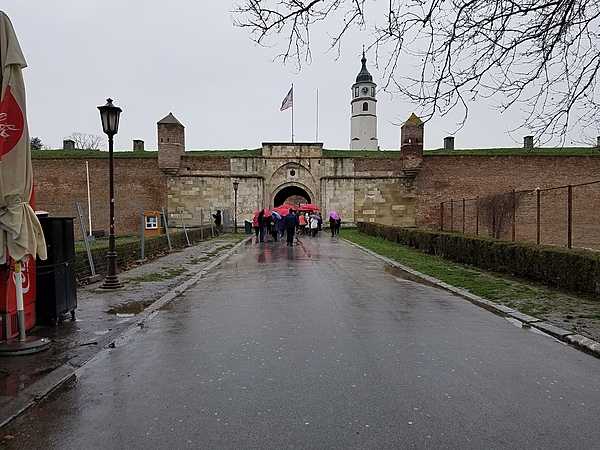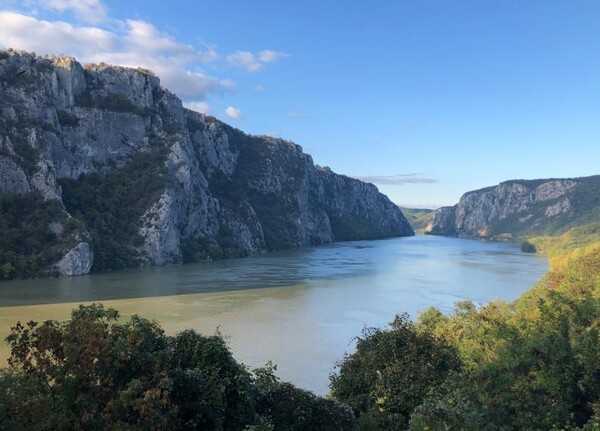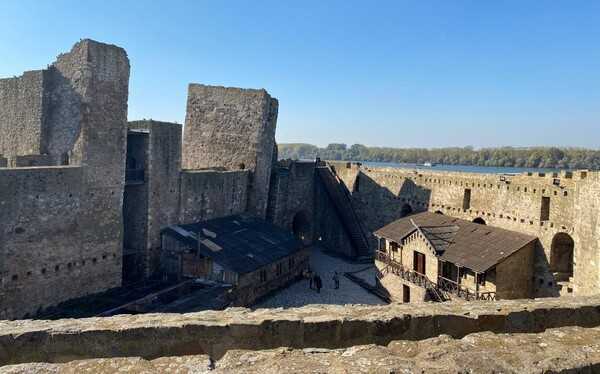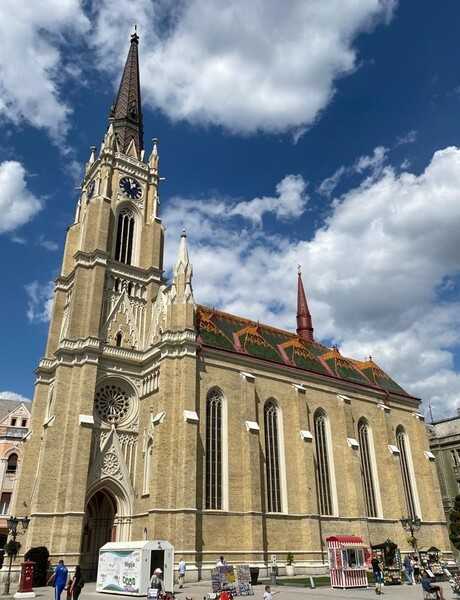Serbia - RS - SRB - SRB - Europe
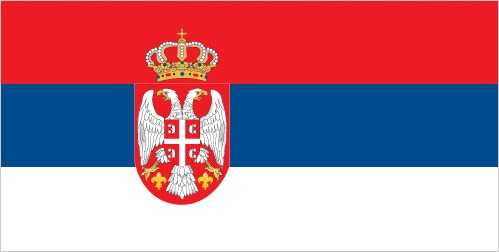
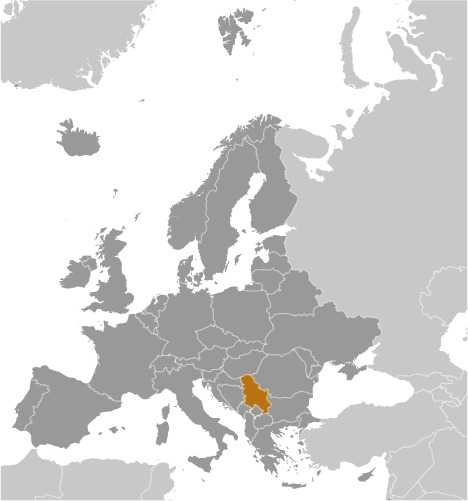
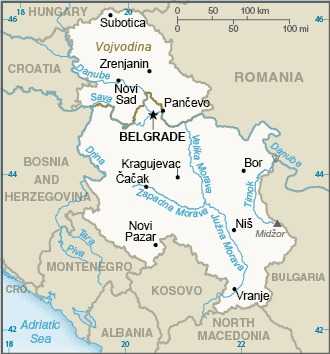
Serbia Images
Serbia Factbook Data
Diplomatic representation from the US
embassy: 92 Bulevar kneza Aleksandra Karadjordjevica, 11040 Belgrade
mailing address: 5070 Belgrade Place, Washington, DC 20521-5070
telephone: [381] (11) 706-4000
FAX: [381] (11) 706-4481
email address and website:
belgradeacs@state.gov
https://rs.usembassy.gov/
Age structure
15-64 years: 65.6% (male 2,198,591/female 2,168,113)
65 years and over: 20% (2024 est.) (male 551,197/female 777,353)
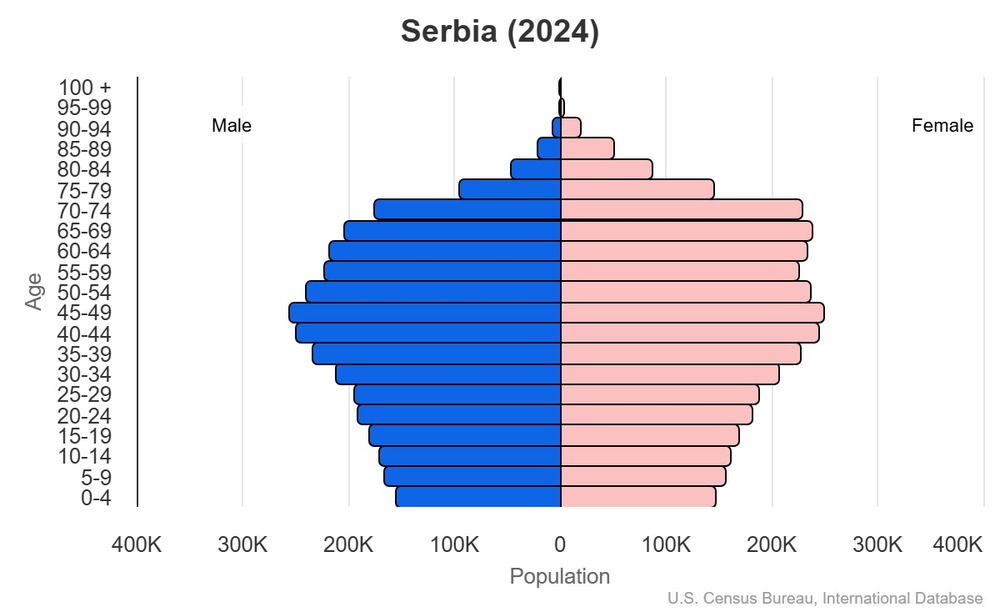
For additional information, please see the entry for Population pyramid on the Definitions and Notes page.
Geographic coordinates
Sex ratio
0-14 years: 1.06 male(s)/female
15-64 years: 1.01 male(s)/female
65 years and over: 0.71 male(s)/female
total population: 0.95 male(s)/female (2024 est.)
Natural hazards
Area - comparative
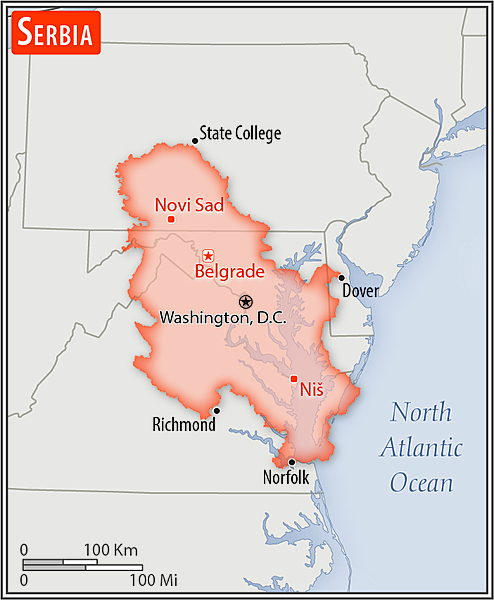
slightly smaller than South Carolina
Military service age and obligation
note: as of 2024, women made up about 11% of the military's full-time personnel
Background
In 1918, the Croats, Serbs, and Slovenes formed a kingdom known after 1929 as Yugoslavia. The monarchy remained in power until 1945, when the communist Partisans headed by Josip Broz (aka TITO) took control of the newly created Socialist Federal Republic of Yugoslavia (SFRY). After TITO died in 1980, communism in Yugoslavia gradually gave way to resurgent nationalism. In 1989, Slobodan MILOSEVIC became president of the Republic of Serbia, and his calls for Serbian domination led to the violent breakup of Yugoslavia along ethnic lines. In 1991, Croatia, Slovenia, and Macedonia declared independence, followed by Bosnia in 1992. The remaining republics of Serbia and Montenegro declared a new Federal Republic of Yugoslavia (FRY) in 1992, and MILOSEVIC led military campaigns to unite ethnic Serbs in neighboring republics into a "Greater Serbia." These actions ultimately failed, and international intervention led to the signing of the Dayton Accords in 1995.
In 1998, an ethnic Albanian insurgency in the formerly autonomous Serbian province of Kosovo resulted in a brutal Serbian counterinsurgency campaign. Serbia rejected a proposed international settlement, and NATO responded with a bombing campaign that forced Serbian forces to withdraw from Kosovo in June 1999. In 2003, the FRY became the State Union of Serbia and Montenegro, a loose federation of the two republics. In 2006, Montenegro seceded and declared itself an independent nation.
In 2008, Kosovo also declared independence -- an action Serbia still refuses to recognize. In 2013, Serbia and Kosovo signed the first agreement of principles governing the normalization of relations between the two countries. Additional agreements were reached in 2015 and 2023, but implementation remains incomplete. Serbia has been an official candidate for EU membership since 2012, and President Aleksandar VUCIC has promoted the ambitious goal of Serbia joining the EU by 2025.
Environmental issues
International environmental agreements
signed, but not ratified: none of the selected agreements
Military expenditures
2.4% of GDP (2023 est.)
2.2% of GDP (2022 est.)
2.2% of GDP (2021 est.)
2% of GDP (2020 est.)
Population below poverty line
note: % of population with income below national poverty line
Household income or consumption by percentage share
highest 10%: 24.7% (2022 est.)
note: % share of income accruing to lowest and highest 10% of population
Exports - commodities
note: top five export commodities based on value in dollars
Exports - partners
note: top five export partners based on percentage share of exports
Administrative divisions
municipalities: Ada*, Aleksandrovac, Aleksinac, Alibunar*, Apatin*, Arandelovac, Arilje, Babusnica, Bac*, Backa Palanka*, Backa Topola*, Backi Petrovac*, Bajina Basta, Batocina, Becej*, Bela Crkva*, Bela Palanka, Beocin*, Blace, Bogatic, Bojnik, Boljevac, Bosilegrad, Brus, Bujanovac, Cajetina, Cicevac, Coka*, Crna Trava, Cuprija, Despotovac, Dimitrov, Doljevac, Gadzin Han, Golubac, Gornji Milanovac, Indija*, Irig*, Ivanjica, Kanjiza*, Kladovo, Knic, Knjazevac, Koceljeva, Kosjeric, Kovacica*, Kovin*, Krupanj, Kucevo, Kula*, Kursumlija, Lajkovac, Lapovo, Lebane, Ljig, Ljubovija, Lucani, Majdanpek, Mali Idos*, Mali Zvornik, Malo Crnice, Medveda, Merosina, Mionica, Negotin, Nova Crnja*, Nova Varos, Novi Becej*, Novi Knezevac*, Odzaci*, Opovo*, Osecina, Paracin, Pecinci*, Petrovac na Mlavi, Plandiste*, Pozega, Presevo, Priboj, Prijepolje, Raca, Raska, Razanj, Rekovac, Ruma*, Secanj*, Senta*, Sid*, Sjenica, Smederevska Palanka, Sokobanja, Srbobran*, Sremski Karlovci*, Stara Pazova*, Surdulica, Svilajnac, Svrljig, Temerin*, Titel*, Topola, Trgoviste, Trstenik, Tutin, Ub, Varvarin, Velika Plana, Veliko Gradiste, Vladicin Han, Vladimirci, Vlasotince, Vrbas*, Vrnjacka Banja, Zabalj*, Zabari, Zagubica, Zitiste*, Zitorada
cities: Beograd (Belgrade), Bor, Cacak, Jagodina, Kikinda*, Kragujevac, Kraljevo, Krusevac, Leskovac, Loznica, Nis, Novi Pazar, Novi Sad*, Pancevo*, Pirot, Pozarevac, Prokuplje, Sabac, Smederevo, Sombor*, Sremska Mitrovica*, Subotica*, Uzice, Valjevo, Vranje, Vrsac*, Zajecar, Zrenjanin*
note: the northern 37 municipalities and 8 cities -- about 28% of Serbia's area -- compose the Autonomous Province of Vojvodina and are indicated with an asterisk
Agricultural products
note: top ten agricultural products based on tonnage
Military and security forces
Serbian Ministry of Internal Affairs: Police Directorate (2025)
note: the Serbian Guard is a brigade-sized unit that is directly subordinate to the Serbian Armed Forces Chief of General Staff; its duties include safeguarding key defense facilities and rendering military honors to top foreign, state, and military officials
Budget
expenditures: $28.12 billion (2022 est.)
note: central government revenues (excluding grants) and expenditures converted to US dollars at average official exchange rate for year indicated
Capital
geographic coordinates: 44 50 N, 20 30 E
time difference: UTC+1 (6 hours ahead of Washington, DC, during Standard Time)
daylight saving time: +1hr, begins last Sunday in March; ends last Sunday in October
etymology: the name comes from the Serbian words beo (white) and grad (city); it probably referred to the white stone of the city fortress
Imports - commodities
note: top five import commodities based on value in dollars
Climate
Coastline
Constitution
amendment process: proposed by at least one third of deputies in the National Assembly, by the president of the republic, by the government, or by petition of at least 150,000 voters; passage of proposals and draft amendments each requires at least two-thirds majority vote in the Assembly; amendments to constitutional articles including the preamble, constitutional principles, and human and minority rights and freedoms also require passage by simple majority vote in a referendum
Exchange rates
Exchange rates:
108.208 (2024 est.)
108.403 (2023 est.)
111.662 (2022 est.)
99.396 (2021 est.)
103.163 (2020 est.)
Executive branch
head of government: Prime Minister Djuro MACUT (since 16 April 2025)
cabinet: Cabinet elected by the National Assembly
election/appointment process: president directly elected by absolute-majority popular vote in 2 rounds, if needed, for a 5-year term (eligible for a second term); prime minister elected by the National Assembly
most recent election date: 17 December 2023
election results:
2022: Aleksandar VUCIC reelected in first round; percent of vote - Aleksandar VUCIC (SNS) 60%, Zdravko PONOS (US) 18.9%, Milos JOVANOVIC (NADA) 6.1%, Bosko OBRADOVIC (Dveri-POKS) 4.5%, Milica DJURDJEVIC STAMENKOVSKI (SSZ) 4.3%, other 6.2%
2017: Aleksandar VUCIC elected president in first round; percent of vote - Aleksandar VUCIC (SNS) 55.1%, Sasa JANKOVIC (independent) 16.4%, Luka MAKSIMOVIC (independent) 9.4%, Vuk JEREMIC (independent) 5.7%, Vojislav SESELJ (SRS) 4.5%, other 7.3%, invalid/blank 1.6%; Prime Minister Ana BRNABIC reelected by the National Assembly on 5 October 2020; National Assembly vote - NA
expected date of next election: 2028
Flag
meaning: red, blue, and white are the pan-Slav colors that represent freedom and revolutionary ideals; the eagle on a red shield represents the government; the smaller shield represents the country; the meaning and origin of the curved white symbols in each quarter are not clear
note: the pan-Slav colors were inspired by Russia's flag
Independence
Industries
Judicial branch
judge selection and term of office: Supreme Court justices proposed by the High Judicial Council (HJC), an 11-member independent body consisting of 8 judges elected by the National Assembly and 3 ex-officio members; justices appointed by the National Assembly; Constitutional Court judges elected - 5 each by the National Assembly, the president, and the Supreme Court of Cassation; initial appointment of Supreme Court judges by the HJC is 3 years and beyond that period tenure is permanent; Constitutional Court judges elected for 9-year terms
subordinate courts: basic courts, higher courts, appellate courts; courts of special jurisdiction include the Administrative Court, commercial courts, and misdemeanor courts
Land boundaries
border countries (8): Bosnia and Herzegovina 345 km; Bulgaria 344 km; Croatia 314 km; Hungary 164 km; Kosovo 366 km; North Macedonia 101 km; Montenegro 157 km; Romania 531 km
Land use
arable land: 31% (2023 est.)
permanent crops: 2.5% (2023 est.)
permanent pasture: 6.6% (2023 est.)
forest: 40.4% (2023 est.)
other: 27.2% (2023 est.)
Legal system
Legislative branch
legislative structure: unicameral
number of seats: 250 (all directly elected)
electoral system: proportional representation
scope of elections: full renewal
term in office: 4 years
most recent election date: 12/17/2023
parties elected and seats per party: Aleksandar Vucic – Serbia Must Not Stop (129); Serbia Against Violence (65); Ivica Dacic - Prime Minister of Serbia (18); Dr Miloš Jovanović - Hope for Serbia (13); We – Voice of the People, Prof. Dr. Branimir Nestorovic (13); Other (12)
percentage of women in chamber: 37.2%
expected date of next election: December 2027
Literacy
male: 99.6% (2022 est.)
female: 99.1% (2022 est.)
Maritime claims
International organization participation
note: Serbia is an EU candidate country and must complete accession criteria before being granted full membership
National holiday
Nationality
adjective: Serbian
Natural resources
Geography - note
Economic overview
Political parties
Democratic Alliance of Croats in Vojvodina or DSHV
Democratic Party or DS
Ecological Uprising or EU
Green - Left Front or ZLF
Greens of Serbia or ZS
Justice and Reconciliation Party or SPP (formerly Bosniak Democratic Union of Sandzak or BDZS)
Movement for Reversal or PZP
Movement for the Restoration of the Kingdom of Serbia or POKS
Movement of Free Citizens or PSG
Movement of Socialists or PS
National Democratic Alternative or NADA (electoral coalition includes NDSS and POKS)
New Communist Party of Yugoslavia or NKPJ
New Democratic Party of Serbia or NDSS or New DSS (formerly Democratic Party of Serbia or DSS)
New Face of Serbia or NLS
Party of Democratic Action of the Sandzak or SDAS
Party of Freedom and Justice or SSP
Party of United Pensioners, Farmers, and Proletarians of Serbia – Solidarity and Justice or PUPS - Solidarity and Justice (formerly Party of United Pensioners of Serbia or PUPS)
People's Movement of Serbia or NPS
People's Movement of Serbs from Kosovo and Metohija or Fatherland
People's Peasant Party or NSS
Political Battle of the Albanians Continues
Russian Party or RS
Serbia Against Violence or SPN (electoral coalition includes DS, SSP, ZLF, Zajedno, NPS, PSG, EU, PZP, USS Sloga, NLS, Fatherland)
Serbia Must Not Stop (electoral coalitions includes SNS, SDPS, PUPS, PSS, SNP, SPO, PS, NSS, USS)
Serbian People's Party or SNP
Serbian Progressive Party or SNS
Serbian Renewal Movement or SPO
Social Democratic Party of Serbia or SDPS
Socialist Party of Serbia or SPS
Strength of Serbia or PSS
Together or ZAJEDNO
United Peasant Party or USS
United Serbia or JS
United Trade Unions of Serbia "Sloga" or USS Sloga
We - The Voice from the People or MI-GIN
Railways
Suffrage
Terrain
Government type
Country name
conventional short form: Serbia
local long form: Republika Srbija
local short form: Srbija
former: People's Republic of Serbia, Socialist Republic of Serbia
etymology: the country takes its name from the Serb people; the origin of their name is unclear but may derive from the Caucasian root word ser, meaning "man"
Location
Map references
Irrigated land
Diplomatic representation in the US
chancery: 1333 16th Street, NW Washington, D.C. 20036
telephone: [1] (202) 507-8654
FAX: [1] (202) 332-3933
email address and website:
info@serbiaembusa.org
http://www.washington.mfa.gov.rs/
consulate(s) general: Chicago, New York
Internet users
Internet country code
Refugees and internally displaced persons
IDPs: 194,171 (2024 est.)
stateless persons: 1,715 (2024 est.)
GDP (official exchange rate)
note: data in current dollars at official exchange rate
Total renewable water resources
note: data includes Kosovo
School life expectancy (primary to tertiary education)
male: 14 years (2022 est.)
female: 16 years (2022 est.)
Urbanization
rate of urbanization: 0.04% annual rate of change (2020-25 est.)
note: data include Kosovo
Drinking water source
urban: 95.4% of population (2022 est.)
rural: 96.1% of population (2022 est.)
total: 95.7% of population (2022 est.)
unimproved:
urban: 4.6% of population (2022 est.)
rural: 3.9% of population (2022 est.)
total: 4.3% of population (2022 est.)
National anthem(s)
lyrics/music: Jovan DORDEVIC/Davorin JENKO
history: adopted 1904; song originally written as part of a play in 1872, and the Serbian people have used it as an anthem in the 20th and 21st centuries
Major urban areas - population
International law organization participation
Physician density
Hospital bed density
National symbol(s)
Mother's mean age at first birth
note: data does not cover Kosovo or Metohija
GDP - composition, by end use
government consumption: 17.8% (2024 est.)
investment in fixed capital: 23.6% (2024 est.)
investment in inventories: 2% (2024 est.)
exports of goods and services: 52.7% (2024 est.)
imports of goods and services: -58.8% (2024 est.)
note: figures may not total 100% due to rounding or gaps in data collection
Dependency ratios
youth dependency ratio: 21.9 (2024 est.)
elderly dependency ratio: 30.4 (2024 est.)
potential support ratio: 3.3 (2024 est.)
Citizenship
citizenship by descent only: at least one parent must be a citizen of Serbia
dual citizenship recognized: yes
residency requirement for naturalization: 3 years
Population distribution
Electricity access
Civil aircraft registration country code prefix
Sanitation facility access
urban: 99.7% of population (2022 est.)
rural: 95.6% of population (2022 est.)
total: 97.9% of population (2022 est.)
unimproved:
urban: 0.3% of population (2022 est.)
rural: 4.4% of population (2022 est.)
total: 2.1% of population (2022 est.)
Ethnic groups
note: most ethnic Albanians boycotted the 2011 census; Romani populations are usually underestimated in official statistics and may represent 5–11% of Serbia's population
Languages
major-language sample(s):
Knjiga svetskih činjenica, neophodan izvor osnovnih informacija. (Serbian)
The World Factbook, the indispensable source for basic information.
note: Serbian, Hungarian, Slovak, Romanian, Croatian, and Ruthenian (Rusyn) are official in the Autonomous Province of Vojvodina; most ethnic Albanians boycotted the 2011 census
Imports - partners
note: top five import partners based on percentage share of imports
Elevation
lowest point: Danube and Timok Rivers 35 m
mean elevation: 442 m
Health expenditure
13.7% of national budget (2022 est.)
Military - note
the modern Serbian military was established in 2006 but traces its origins back through World War II, World War I, the Balkan Wars of 1912-1913, and the Bulgarian-Serb War of 1885 to the First (1804-1813) and Second (1815-1817) Uprisings against the Ottoman Empire (2025)
Military and security service personnel strengths
Military deployments
Total water withdrawal
industrial: 3.967 billion cubic meters (2022)
agricultural: 422 million cubic meters (2022)
Waste and recycling
percent of municipal solid waste recycled: 1% (2022 est.)
Average household expenditures
on alcohol and tobacco: 7.8% of household expenditures (2023 est.)
Major watersheds (area sq km)
Major rivers (by length in km)
note: [s] after country name indicates river source; [m] after country name indicates river mouth
National heritage
selected World Heritage Site locales: Stari Ras and Sopoćani; Studenica Monastery; Gamzigrad-Romuliana, Palace of Galerius; Stećci Medieval Tombstone Graveyards
Child marriage
women married by age 18: 5.5% (2019)
Coal
consumption: 37.828 million metric tons (2023 est.)
exports: 16,000 metric tons (2023 est.)
imports: 4.542 million metric tons (2023 est.)
proven reserves: 7.112 billion metric tons (2023 est.)
Electricity generation sources
solar: 1% of total installed capacity (2023 est.)
wind: 2.6% of total installed capacity (2023 est.)
hydroelectricity: 30.7% of total installed capacity (2023 est.)
biomass and waste: 0.6% of total installed capacity (2023 est.)
Natural gas
consumption: 2.886 billion cubic meters (2023 est.)
imports: 2.471 billion cubic meters (2023 est.)
proven reserves: 48.139 billion cubic meters (2021 est.)
Petroleum
refined petroleum consumption: 88,000 bbl/day (2023 est.)
crude oil estimated reserves: 77.5 million barrels (2021 est.)
Currently married women (ages 15-49)
Remittances
8.5% of GDP (2022 est.)
6.9% of GDP (2021 est.)
note: personal transfers and compensation between resident and non-resident individuals/households/entities
Geoparks
global geoparks and regional networks: Djerdap (2023)
National color(s)
Particulate matter emissions
Labor force
note: number of people ages 15 or older who are employed or seeking work
Youth unemployment rate (ages 15-24)
male: 21.8% (2024 est.)
female: 24.1% (2024 est.)
note: % of labor force ages 15-24 seeking employment
Debt - external
note: present value of external debt in current US dollars
Maternal mortality ratio
Reserves of foreign exchange and gold
$27.569 billion (2023 est.)
$20.68 billion (2022 est.)
note: holdings of gold (year-end prices)/foreign exchange/special drawing rights in current dollars
Unemployment rate
8.3% (2023 est.)
8.5% (2022 est.)
note: % of labor force seeking employment
Population
male: 3,242,751
female: 3,409,461
Carbon dioxide emissions
from coal and metallurgical coke: 27.743 million metric tonnes of CO2 (2023 est.)
from petroleum and other liquids: 11.665 million metric tonnes of CO2 (2023 est.)
from consumed natural gas: 5.374 million metric tonnes of CO2 (2023 est.)
Area
land: 77,474 sq km
water: 0 sq km
Taxes and other revenues
note: central government tax revenue as a % of GDP
Real GDP (purchasing power parity)
$170.482 billion (2023 est.)
$164.166 billion (2022 est.)
note: data in 2021 dollars
Airports
Gini Index coefficient - distribution of family income
note: index (0-100) of income distribution; higher values represent greater inequality
Inflation rate (consumer prices)
12.4% (2023 est.)
12% (2022 est.)
note: annual % change based on consumer prices
Current account balance
-$4.457 billion (2022 est.)
-$2.654 billion (2021 est.)
note: balance of payments - net trade and primary/secondary income in current dollars
Real GDP per capita
$25,700 (2023 est.)
$24,600 (2022 est.)
note: data in 2021 dollars
Broadband - fixed subscriptions
subscriptions per 100 inhabitants: 31 (2023 est.)
Tobacco use
male: 37.8% (2025 est.)
female: 34.5% (2025 est.)
Obesity - adult prevalence rate
Energy consumption per capita
Electricity
consumption: 34.413 billion kWh (2023 est.)
exports: 7.351 billion kWh (2023 est.)
imports: 5.395 billion kWh (2023 est.)
transmission/distribution losses: 4.881 billion kWh (2023 est.)
Children under the age of 5 years underweight
Imports
$47.395 billion (2022 est.)
$39.476 billion (2021 est.)
note: balance of payments - imports of goods and services in current dollars
Exports
$39.905 billion (2022 est.)
$34.035 billion (2021 est.)
note: balance of payments - exports of goods and services in current dollars
Heliports
Telephones - fixed lines
subscriptions per 100 inhabitants: 37 (2023 est.)
Alcohol consumption per capita
beer: 3.24 liters of pure alcohol (2019 est.)
wine: 1.62 liters of pure alcohol (2019 est.)
spirits: 2.37 liters of pure alcohol (2019 est.)
other alcohols: 0.22 liters of pure alcohol (2019 est.)
Life expectancy at birth
male: 72.7 years
female: 78.1 years
Real GDP growth rate
3.8% (2023 est.)
2.6% (2022 est.)
note: annual GDP % growth based on constant local currency
Industrial production growth rate
note: annual % change in industrial value added based on constant local currency
GDP - composition, by sector of origin
industry: 23.3% (2024 est.)
services: 58.5% (2024 est.)
note: figures may not total 100% due to non-allocated consumption not captured in sector-reported data
Education expenditure
8.4% national budget (2023 est.)
Military equipment inventories and acquisitions
Religions
Gross reproduction rate
Net migration rate
Median age
male: 42.4 years
female: 45.4 years
Total fertility rate
Infant mortality rate
male: 5.1 deaths/1,000 live births
female: 3.9 deaths/1,000 live births
Telephones - mobile cellular
subscriptions per 100 inhabitants: 124 (2021 est.)
